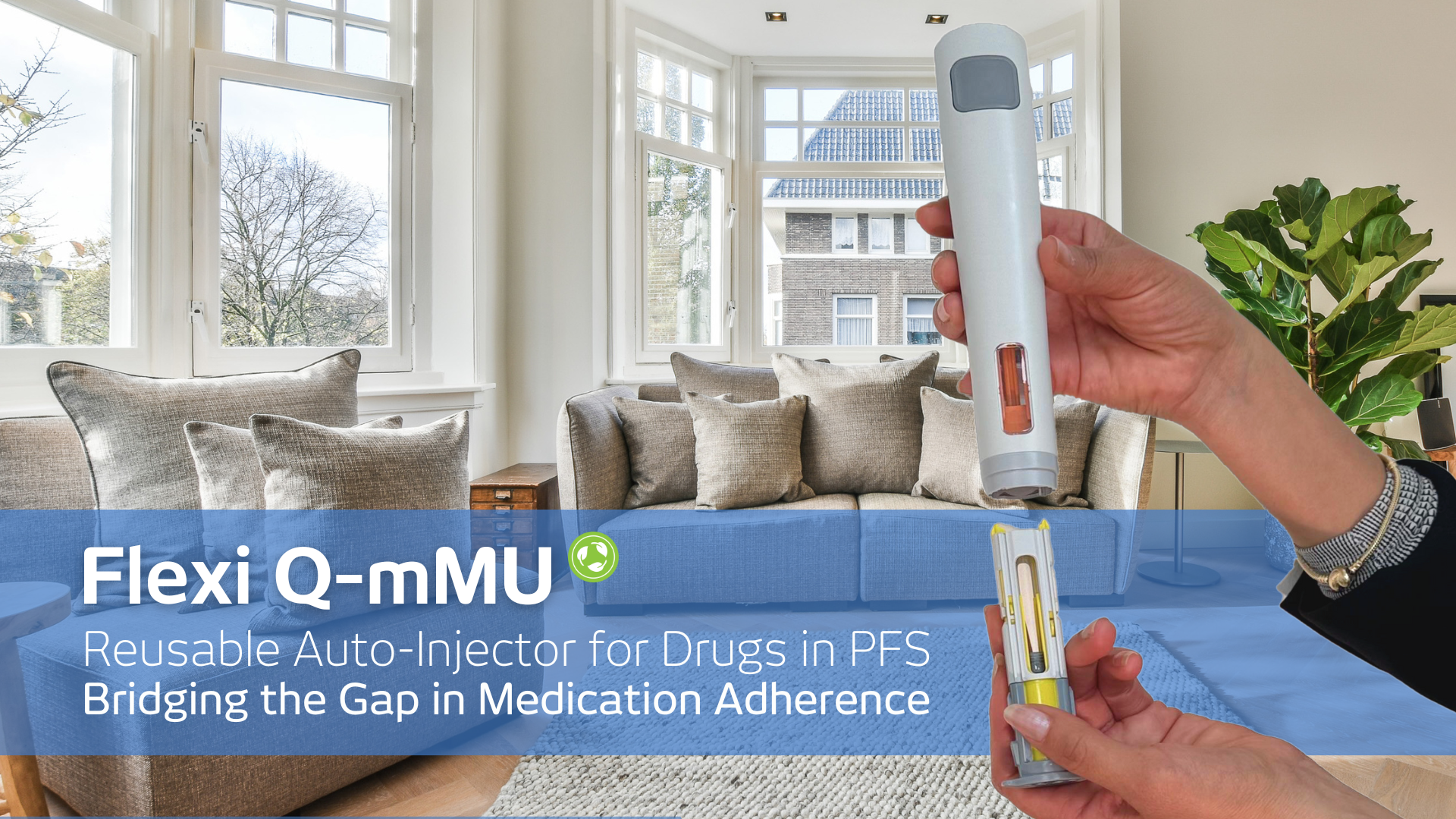
Introduction
Adhering to a medication schedule is crucial for successful treatment outcomes, especially for patients living with chronic diseases that require continuous, long-term therapy. Today, many of these therapies use injectable medicines delivered through home-use devices—such as auto-injectors—that enable patients to administer their own doses. Many patients, however, discontinue their prescribed medications due to significant challenges, such as: high costs per injection, complexity of device usage, and environmental concerns associated with traditional single-use, disposable delivery devices. The absence of solutions to such issues leads to poorer health outcomes – and addressing these challenges is critical for enhancing medication adherence, thereby improving overall healthcare efficacy.
The Challenge of Medication Non-adherence
Failing to follow a prescribed treatment plan can make chronic illnesses more difficult to manage, potentially accelerating disease progression, increasing the risk of hospital admissions, and raising overall healthcare costs. Understanding the factors that contribute to non-adherence is therefore essential for developing effective interventions.
Affordability Challenges
The financial burden of frequent medication injections is a significant barrier for many patients. Escalating prices for both medications and their delivery devices can create a substantial financial burden—especially for people with limited insurance coverage or fixed incomes. The cumulative expense of long-term therapies can be prohibitive, forcing patients to choose between their healthcare needs and other essential living expenses. This financial strain often leads to missed doses, reduced dosing frequency, or complete discontinuation of therapy, with negative impacts on healthcare outcomes.
Usability Challenges in Medication Administration
Ease of use of delivery devices for self-injected medications plays a critical role in patient adherence. Devices that are cumbersome to use or hard to understand can discourage patients from sticking with their medication schedule. Factors contributing to such usability challenges include:
- Technical Complexity: Devices requiring multiple and/or intricate handling steps increase the likelihood of user error and frustration.
- Physical Limitations: Patients with reduced manual dexterity, visual impairments, or other physical and cognitive challenges may struggle to correctly use self-injection devices.
- Lifestyle Interference: Devices that do not integrate seamlessly into daily routines can be perceived by patients as being inconvenient, leading to lower adherence rates.
- Unless these usability concerns are adequately addressed, patients may experience unease or lack confidence in self-administration, resulting in missed doses, incorrect device usage, or abandonment of therapy.
Environmental Concerns
Environmental sustainability is becoming an increasingly vital priority in the healthcare sector. This is particularly important in the case of traditional single-use drug delivery devices, which contribute significantly to medical waste, raising ecological and sustainability issues—and creating challenges for safe and economic disposal. Developing drug-delivery device solutions that reduce waste and utilize sustainable materials is essential for aligning healthcare practices with environmental values and enhancing patient acceptance. This should be a priority for pharmaceutical companies when choosing a device to align with their injectable drug products.
Addressing the Challenges
At Elcam Drug Delivery Devices (E3D), we are committed to overcoming these challenges by focusing on the entire healthcare chain—from pharmaceutical companies and drug therapies to healthcare providers and patient care. Our mission is to develop and supply high-quality, innovative devices that bridge the gap in medication adherence through cost-effective, user-friendly, and environmentally sustainable solutions. The Flexi-Q mMU Reusable Auto-injector embodies our commitment by offering an innovative solution to the challenges of medication non-adherence.
Cost-Effective Solutions
Flexi-Q mMU is designed to ease the financial burden by reducing the device-related cost per injection by as much as 75% through its reusable design, allowing for injections from a single device over the course of several years. This economic efficiency benefits both patients and healthcare providers by greatly lowering device-related costs, ensuring long-term therapy is more affordable and accessible. By addressing affordability challenges, patients are encouraged to consistently adhere to their prescribed treatment plans.
Enhancing Usability to Promote Adherence
Understanding that ease of use is critical for medication adherence, Flexi-Q mMU has been engineered to promote simplicity and patient confidence:
- User-friendly Design: An intuitive interface minimizes steps required for injection, reducing the potential for user error.
- Reliable Performance: Consistent and accurate medication delivery builds trust and confidence in self-administration.
- Ergonomic Construction: Comfortable handling accommodates patients with varying levels of manual dexterity, including those whose conditions involve physical limitations.
Commitment to Environmental Sustainability
Environmental responsibility is an integral part of E3D’s mission. Flexi-Q mMU is a reusable platform that reduces the volume of waste materials by approximately 70% or more, compared to single-use auto-injector devices, thereby minimizing our ecological footprint.
Conclusion
Flexi-Q mMU represents a significant advancement in auto-injector technology, directly addressing the primary obstacles to medication adherence. By focusing on cost-effectiveness, ease of use, and environmental sustainability, Flexi-Q mMU empowers patients to maintain their treatment regimens, enhances health outcomes, and reduces overall healthcare costs. This innovative auto-injector device is therefore an attractive solution for pharmaceutical companies seeking to improve patient adherence, economics, and therapeutic results.
